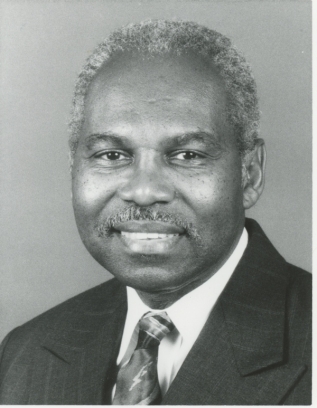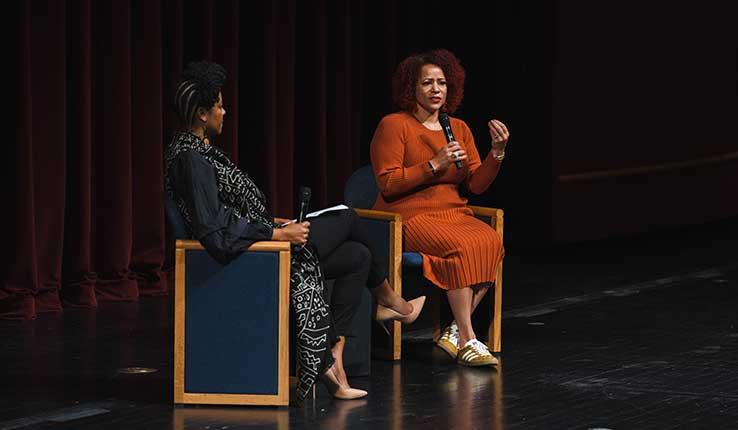In Memoriam: William R. Scott
William R. Scott, professor emeritus of history and the first director of Lehigh’s Africana Studies program, died recently at the age of 77. Scott was the author of a widely respected anthology on African American history in the United States and an expert in the area of Ethiopian symbolism in U.S. black thought.
A funeral service for Scott will be held at 11 a.m. Monday, May 15, in Packer Memorial Church. The campus community is invited to attend the service, which will be conducted by the Resurrected Life Community Church of Allentown. A viewing and greeting of the family will be held at 10 a.m. in the church, and a time of reflection and fellowship will follow the service from 12:30 to 3 p.m. in the Asa Packer Dining Room in the University Center.
James Peterson, associate professor of English, who succeeded Scott as the director of Africana Studies, said it was difficult to fully assess Scott’s contributions to Lehigh.
“There simply is no way—in words or otherwise—to articulate the impact that Professor William R. Scott has had on Lehigh University, especially the Africana Studies program,” Peterson said. “He is the founding director of Africana Studies, our program’s sui generis leader—and now, celestial guardian. His wisdom and guidance have been indispensable to me in my short time as the director of Africana Studies.
“Nothing that I have accomplished here at Lehigh isn’t informed by and/or directly inspired by Bill Scott and my sense is that this is equally true for the program itself,” Peterson said. “As we celebrate his life and his immeasurable contributions to the world, I hope all will join me in my commitment to solidifying his legacy here at Lehigh University.”
Ted Morgan, University Distinguished Professor of Political Science, chaired the search committee that brought Scott to Lehigh. Morgan said Scott’s potential to significantly impact the Lehigh culture was apparent from the outset.
“His gentle, scholarly manner endeared him to so many, but also, behind that manner lurked a fiercely determined advocate for social justice,” said Morgan. Scott and a few committed faculty kept the Africana Studies program alive during a period of dwindling support from the university, Morgan said.
“It was my great pleasure to serve with Bill as interim director of Africana Studies when Bill finally stepped down,” Morgan said. “The process he and others set in motion has, today, produced a truly marvelous and vital Africana Studies program, which under James Peterson's gifted leadership has already had a major impact on this university.”
Lloyd Steffen, university chaplain and professor of religion studies, described Scott as a “fine scholar, demanding teacher and cherished member of the Lehigh community” whose impact on Lehigh endures.
“He contributed enormous energy and passion toward making Lehigh a more inclusive community, not only through curricular offerings and new and important academic programs like Africana Studies, but in his other activities on campus, like working for many years with the Martin Luther King Committee,” said Steffen, who also directs Lehigh’s Center for Dialogue, Ethics and Spirituality.
“He was also a person of deep faith and I know his family and many friends will take comfort in remembering how important his church community was to him, especially in these last years. All who knew Bill are today mourning his loss. He will be missed.”
A lifetime of scholarly examination
Born in Philadelphia, Scott graduated with honors from Central High Boys School, where he lettered in track and football. He earned a Bachelor of Arts degree (cum laude) from Lincoln University, and a Master of Arts degree in African history from Howard University. At Princeton, he earned a Master of Arts degree in American history and a Ph.D. in American history.
He taught at the University of Wisconsin (Madison), Wellesley—where he also chaired the department of Black Studies and served as associate dean—and at Harvard, Oberlin and Clark Atlanta University, where he was named Dean of Arts and Science. Scott also served as director of the UNCF/Mellon Ministry Fellowship Program.
He came to Lehigh as a full professor of history in 1992 and was named the first director of the African-American studies program.
In 2000, Scott and fellow Lehigh history professor William Shade co-authored a collection of essays by top scholars on slavery, titled Upon These Shores: Themes in the African-American Experience, 1600 to the Present. The culmination of seven years of work, the book began as a project for the United States Information Agency, which promoted U.S. interests through educational and cultural activities around the world.
The completed anthology covered each period of African American history, including the Middle Passage, the Great Migration, abolition and the civil rights movement. Lehigh professors who contributed essays included Jean Soderlund, then chair of the history department, and Morgan, who wrote about the contemporary civil rights movement.
Earlier, Scott had authored The Sons of Sheba’s Race: African Americans and the Italo-Ethiopian War, 1935-1941, which examined the role of African Americans in the U.S. Ethiopian defense and aid movement, and ways in which the Italian invasion of Ethiopia affected African American thought and behavior on the eve of World War II. He also authored a third book, Americans from Africa: Essays on Black History, Culture and Society, and a number of scholarly articles over the course of his long academic career.
Scott also traveled extensively, did volunteer work in Ethiopia and Tanzania, served as a U.S. scholar in Kenya, Lesotho, Swaziland, Botswana and South Africa, and worked in Johannesburg with the Educational Opportunities Council, which was headed by Desmond Tutu. In 1968, he co-founded the New Jersey Committee on Southern Africa, one of the country’s first anti-apartheid movements.
In an editorial in 1997, he wrote that the nation’s schools and churches must play a pivotal role in countering the lingering effects of racism on the American consciousness. “Teachers and preachers,” he wrote, “affect the thoughts and beliefs of vast numbers of Americans.”
True to his words, he was deeply involved in the Cultural and Scholarship Ministry at Easton’s Greater Shiloh Baptist Church, and he wrote and narrated a documentary of the church’s history titled “A Long Walk by Faith: History of the Greater Shiloh Church, 1904-2010.” In his later years, he served as a scholar in residence for the Resurrected Life Community Church in Allentown, where he also directed the Community Development Board.
Story by Linda Harbrecht
Posted on:





